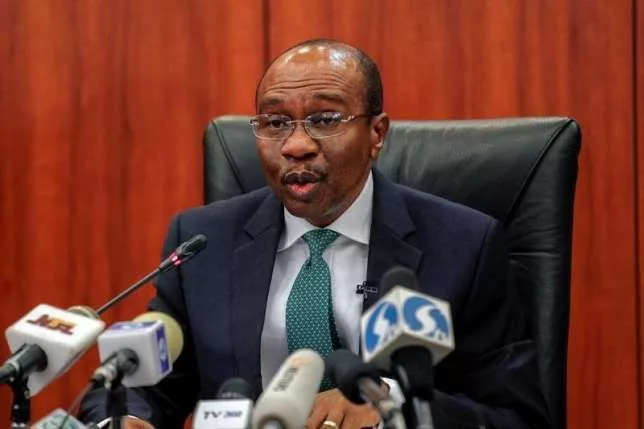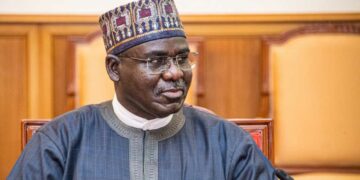The recent cash withdrawal policy of the CBN is a cash-less tool that is expected to stimulate economic growth through modernization of the payment system and improve the effectiveness of monetary system, MARK ITSIBOR reports
Obviously, there are concerns that the restrictions on cash withdrawals that was recently imposed by the Central Bank of Nigeria (CBN) will make business transactions in the informal sector difficult. Those who belong to that league point to the fact that a significant number of Nigerians have no bank accounts and use informal markets where cash is preferred.
If you ask operators in the real sector, they would say there is really no cause for concern. That is born of the fact that online financial transaction has permeated the entire segments of the economy, leaving an overwhelming acceptability by the formal and informal sectors.
According to official data, as of October 2022, agency banking network in Nigeria has increased to 1.4 million, in almost all the local governments of the country. That explains why CBN governor Godwin Emefiele insists that Nigerians, including those in rural areas can access agency banking anywhere. “Currency points are over the country,” he said.
Those who have been following developments in the financial sector know that the idea of cash withdrawal limit is not new. It is part of the financial inclusion drive of the central bank which it has been implementing in phases since 2012.
From introduction of the widely celebrated bank verification number, electronic money transfer through the use of mobile Apps, Unstructured Supplementary Service Data (USSD) code to other banking instruments like the central bank digital currency (eNaira) and now, cash withdrawal limit, the CBN has consistently been engaged in unboding more people into the financial inclusion safety net.
In reality, the informal sector has been a major promoter of CBN’s technology-based payment services. According to reports, there is a surge in adoption of mobile money in Nigeria. There is obviously a gravitation towards contactless, cashless and digital payment platforms to avoid human contact. The global lockdowns during the outbreak of COVID-19 pandemic in 2020 amplified that more.
As it stands, the tech ecosystem is attracting hundreds of thousands of small businesses in the sprawling informal economy online. Through a marketplace model, many fintech firms have indicated the capacity to advance the digital payment service platforms that have been created in the financial sector to enable everyone, including small businesses receive online payments seamlessly. For instance, Paga is one of the companies in Nigeria that are devising strategies to increase access to digital payments for the informal economy.
For economic experts, those who are afraid of the unexpected downside of the new policy are not exposed to the many benefits such a money control policy of the central bank holds for financial systems stability, financial crimes prevention, the political system and general economy of the nation.
According to World Bank, digital payments are essential to economic growth. The financial institution had stressed that integrating digital into payment solutions and platforms could help developing economies like Nigerians’ bypass many of the challenges in legacy payments and banking, in order to gain access to affordable and relevant financial solutions.
There are reports to the effect that use of digital devices like mobile phones and the internet have the potential to transform the informal economy and provide businesses of all sizes with the opportunity to reach new markets and to formalise their operations of the small businesses.
Findings by this reporter have shown that to limit the use of cash is an apparent bid to create a more transparent system, curb counterfeiting, and discourage ransom payments to kidnappers.
Some economic experts have actually described the move as evolutionary, with a capacity to make Nigeria one of the most disciplined nations in terms of cash movement worldwide, if the initiative is faithfully followed through. The general believe among the experts is that the move will lower crime rates, rein in inflation, cut cost of cash management and have much beneficial effect on the economy.
In a circular that was issued by the central bank to announce the new restriction, the CBN ruled that individual and corporate organisations’ withdrawal limits are not to exceed N100,000 and N500,000 per week. Withdrawals above these limits, the circular stated, will attract processing fees of five per cent for individuals and 10 per cent for corporate organisations.
In the new directive to commercial banks, third party cheques above N50,000 will no longer be eligible for payment over the counter, while extant limits of N10,000,000 on clearing cheques still subsist.
The circular also stated that the maximum cash withdrawal per week via automated teller machine shall be N100,000 subject to a maximum of N20,000 cash withdrawal per day as only denominations of N200 and below shall be loaded into the ATMs. Likewise, the maximum cash withdrawal via point-of-sale terminal was fixed at N20,000 daily.
In compelling circumstances, not exceeding once a month, where cash withdrawals above the prescribed limits is required for legitimate purposes, the CBN also said that such cash withdrawals will not exceed N5 million and N10 million for individuals and corporate organisations, respectively, with a caveat that such high transactions would be subject to the referenced processing fees in addition to enhanced due diligence and further information requirements.
The move aims to bring more people into the banking system and reduce cost of credit. The new policy will take effect from January 9, 2023. A peep into some of the benefits of the new monetary policy shows that its implementation would cut cash management cost and make local and international payments become much easier.
Professor of Economics at University of Benin, Hassan Ebhozele Oaikhenan said the policy on money control is a welcome development if the apex bank is able to have a firm control on the quantity of higher denominations in circulation. For him, the new policy will have a beneficial spillover effect on the economy by helping to manage interest rate, limit the capacity of politicians to buy votes and help control inflation.
“It’s a welcome development. Like it is done in the Europe, I expect the CBN to make the higher denominations very scarce as a way of putting a tight control on the quantity of money in circulation. “If the CBN cannot do this, then, the entire policy will be defeated,” he stated.
On the coming elections, the university lecturer said the new policy will limit the capacity of the politicians to conduct the nefarious transaction of vote buying. “It will definitely have spillover effect on the political space; to a large extend, make our elections free.”
He said allowing the naira to be available has long made it possible for round tripping as anybody can spend the naira to buy the dollar at whatever rate. “That explains the phenomenal depreciation over the years,” he said.
Economic Analyst Stephen Kanabe said the move will impact positively on monetary policy – enhance efficacy and make interventions of the bank more impactful.
An economist, Tope Fasua expects the policy to limit vote buying, a situation that strongly leads to election manipulation in Nigeria. “So, for elections we are not supposed to be encouraging payments of cash to voters. So, anything that can also limit corruption should be supported. I think it is a good one from the central bank,” he stated.
Stating that there will be some initial hiccups with businesses such as instances where POS machines do not work and the normal hiccups of trying to process transactions online, downtime, internet issues and other sundry issues, Fasua said it is a way of actually getting a better handle of monetary policy management in the country and perhaps, more importantly, reducing corruption.
“When there is too much funds in the society, that means corruption is alive and thriving. I think it is something they ought to have done a while ago, but they are doing it now. There is never a good time to do some of these things because people will complain. The idea is that you pilot some of these programmes and then be ready to make amendments and changes as time goes on to reflect the reality on ground,” he stated.
Many countries are moving towards a cashless society, in which all financial transactions are electronic. Not a few people agree that in addition to simply eliminating the costs and hassles of managing currency, going cashless may also reduce certain types of crime.
However beautiful the policy seems, point-of-sale terminal operators and Lagos-based human rights lawyer Femi Falana are leading a revolt against the policy economic and financial experts say will revolutionarise Nigeria’s payment system. Both Falana and the agent banking operators have threatened to sue the central bank if it fails to withdraw the restrictions and allow huge carriage of banknotes, a system that is fast fading from global financial system.
The fear is that implementation of the new policy could expose bank customers and other users of the online payment platforms to the risks associated with it. The downsides of going cashless include less privacy, greater exposure to hacking, technological dependency, magnifying economic inequality, and more.
Despite the perceived challenges of the policy, the authorities should simply address the grey areas and allow implementation its implementation for inflation control, fight counterfeiting and hording of the currency and to support economic growth. Kenya is years ahead of Nigeria in cashless innovation so much so that Nigeria is playing catch-up. If not done now, Nigeria may be left behind in the already digitalised global payment system.





